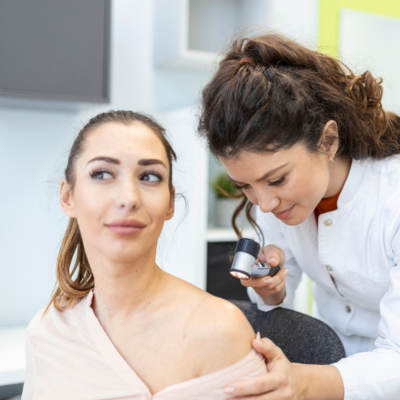Acne
If you’re suffering from acne breakouts, you already know how difficult and frustrating it can be to treat this skin condition. Here at California Skin Institute, we’ve helped thousands of patients get their breakouts under control by customizing a regimen just for you.
How Acne Forms
Although acne is a very visible issue that typically appears in the form of whiteheads, blackheads and inflammation, the problem actually begins under the skin.
Under the skin, you have small structures called sebaceous glands. These glands produce a special oil (called sebum) which lubricates your skin and hair.
Typically, sebum passes through the hair follicle without any problems. However, if the follicle becomes blocked, the sebum will begin to build up inside, which leads to pimples. This follicular blockage can happen for many reasons, including; too much sebum being produced, dead skin cells or makeup blocking the exit point, or too many skin cells being shed within the follicle.
When the follicle has become blocked, acne begins to form because sebaceous glands continue to produce sebum. Since the sebum has nowhere to go, the follicle begins to widen, which causes some of the pain and inflammation in the area. Further, acne-causing bacteria find this environment very hospitable, and their numbers begin to grow.
Different Types of Acne
Although blocked follicles are the primary mechanism for acne formation, the actual breakouts can manifest in several ways, leading to many different types of acne.
- Whiteheads: This type of acne occurs when the follicle becomes closed off at the surface of the skin. This causes the sebum to build up inside the pore, with the white coloration being the sebum, dead cells, and bacteria directly under the skin.
- Blackheads: Blackheads form when the follicle has become clogged, but isn’t blocked off from the surface. Instead, the edges of the follicle expand, causing the pore to appear larger. Contrary to popular belief, the dark coloration of blackheads isn’t dust or dirt. Instead, the color mainly comes from the oxidation of sebum, which becomes darker.
- Pustules: Pustules are a type of acne where the infection with the follicle has become more advanced, causing dead skin cells and puss to build up inside. This type of pimple is typically painful and appears swollen.
- Cystic acne: Cystic acne is one of the most severe types of acne. In this case, the sebum and pus begin to build up inside the skin. However, instead of breaking through the surface or being healed by the immune system, the acne continues to grow deep into the skin, even rupturing the sebaceous glands in some cases. This is the most difficult type of acne to treat, because it is too deep for most topical medications to be effective.
Underlying Causes of Acne
There are many different reasons for the over-production of sebum in the skin and the blockage of follicles, however, one of the most common reasons has to do with hormones. During teenage years and during pregnancy, hormone levels can become unbalanced, which causes sebaceous glands to produce more sebum. Because the follicle must accommodate a larger amount of this oil, the chances for blockage increase. Further, acne is more likely to become aggressive because the larger amount of sebum will continue to be produced once the follicle is blocked, causing it to expand faster.
Acne Treatments
California Skin Institute practitioners are able to offer many treatment options to our patients, and have helped many patients get rid of acne by using a number of different techniques. Our practitioners are highly skilled in administering acne extractions, helping patients find the best topical products and providing skin cleansing consultations, assisting patients with better acne diet solutions, offering blue light therapy, prescription acne treatments, and much more.
If you’d like to take control of your acne and speak with an expert, schedule your consultation by calling a California Skin Institute practice near you, or fill out the Contact Form below!
Disclaimer
This is to be only used as an educational piece and individuals should not use it to self-diagnose a skin condition or problem.
Treatments for Acne




 / 291 Reviews
/ 291 Reviews